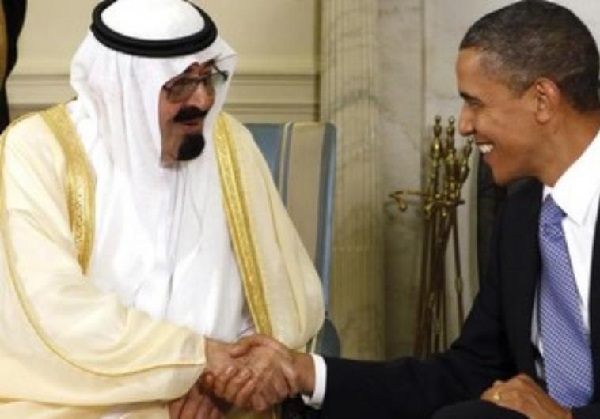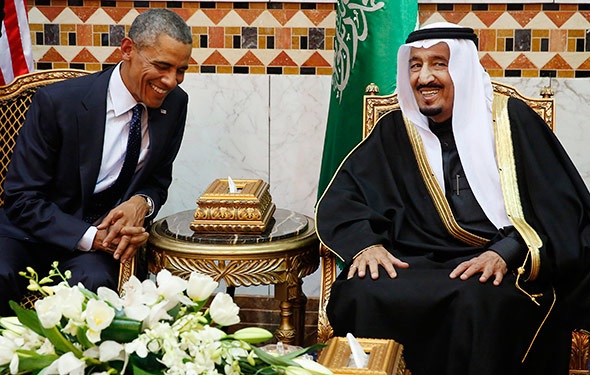The meeting between the US President Barack Obama and King Salman of Saudi Arabia in Washington on Friday has aroused much interest since it is taking place at a crucial stage in Middle East politics and the pivotal US-Saudi cooperation in regional affairs have been under the weather in the recent years ever since the Arab Spring appeared in Egypt and swept away Hosni Mubarak.
Salam’s visit to the US impacts international security from many angles The Iran nuclear deal, Islamic States’ growing appeal globally, fall in oil prices these come readily to mind but what also cannot be lost sight of is that the US’ preoccupations in the Middle East crisis is a major factor rendering ineffectual its capacity to ‘rebalance’ Asia. Having said that, unlike many of his predecessors, Obama will be talking to Salman from a position of advantage.
The point is, he or his family members are not known to have benefited out of the well-known munificence of the fabulously wealthy Saudi royal family, which enables him to handle the inter-state relationship in a very different way from the movers and shakers in America’s political class.
Secondly, there is surely a swagger in Obama’s step as he meets Salman. He just secured the US Senate votes he needs to implement the Iran nuclear deal. And he secured it despite all that the Saudi and Israeli lobbies did, independently and jointly, to frustrate him.
Indeed, Obama pointedly kept Saudi Arabia in the dark when he decided to engage Iran in direct talks. He sought help from Oman instead to set up the talks and the Saudis learnt only much later that the talks were progressing. Clearly, the elderly Saudi monarch is today left with little leeway to influence Obama’s policy toward Iran during the period ahead.
Thirdly, something has fundamentally shifted in the character of the US-Saudi relationship. Plainly put, the US needs much less of oil from Saudi Arabia than it once did. So, as Bloomberg put it in a pithy analysis,
Saudi Arabia isn’t the powerhouse it was when the U.S. and its gas-guzzling cars and industry demanded more and more imported crude. It relied on the desert kingdom to keep the spigot open. Booming U.S. energy production over the last decade has changed the balance along with falling prices for oil. From 2003 to 2015, the Saudi share of the U.S.’s oil supply declined by half to six percent.
Put differently, ever since Franklin Roosevelt spoke with Saudi King Abdul Aziz on board a US warship in the Suez Canal near Cairo as he was returning from the Yalta Conference in a fateful meeting that lasted several days, energy is not at the top of the talking point for Obama. (They spoke in French.)
In sum, Obama is today entering new territory. How far he will use the opportunity to restructure the US-Saudi relationship is the big question. Consider the following. Saudi Arabia is an extremely repressive regime. Its violent authoritarianism is not only unsustainable in the medium term but also creates a polarized environment elsewhere in the region, which badly needs reform.

Yet, the US has so far preferred a relationship defined by large-scale arms sales and military cooperation and a profound (largely unspoken) financial entanglement and banking tie-ups that is of immense mutual benefit, which prompted Washington to deal with kid gloves the abominable Saudi record in religious intolerance and incitement, brutal repression of dissent and resistance to reform.
It is a blot on Obama’s presidential legacy and erodes the credibility of his professed faith in America’s exceptionalism that he has miserably failed to raise any human rights issues with a Saudi king. Salman’s visit offers probably the last chance for Obama to make amends during his presidency to tell the Saudi monarch that his country promotes instability, foments sectarianism and violent extremism.
Indeed, the US is in a position today to leverage the acute awareness on the part of the Saudis that the relationship with it is the most crucial relationship that they have in the regional and world situation. Provided, of course, if Obama wants to. From all accounts, America is highly unlikely to elect another cerebral president again for a foreseeable future. That is why the ‘hard talk’ is needed with Saudi Arabia during the Obama presidency.
Obama would understand that Saudi Arabia’s export of Wahhabi puritanical Islam has been “one of many worst issues to occur to Muslim and Arab pluralism” to quote Thomas Friedman from Morocco to Pakistan to Indonesia. The upheaval in Bahrain, the conflicts in Syria and Iraq and the war in Yemen the roots are traceable to Saudi policies.
But, it is highly improbable that Obama will bell the cat. The likelihood seems to be that the US’ appeasement policy toward Saudi Arabia will continue. The trend is already there. Roula Khalaf, FT’s Foreign Editor and one of the most perceptive observers of the Middle East, wrote recently,
In both Bahrain and Egypt, the US acted with an eye towards Saudi Arabia, the increasingly assertive leader of the Sunni Arab camp, and backer of the Bahraini monarchy and Egypt’s military coup.
But it is in Yemen that the US mollification of Arab allies could have the most destructive impact. At a time when the US priority is and that of all its allies should be the fight against the Islamic State of Iraq and the Levant, the group known as Isis, Washington has supported a Saudi-led military campaign that has spread more chaos.
She highlighted Yemen as a particularly strange case where all evidence suggests that the US has misgivings about the Saudi campaign. Obama himself has openly doubted Iran’s involvement with the Houthi rebels (which is the Saudi justification for military intervention in Yemen) and he has been very profound in his diagnosis of the Middle East’s problems that the biggest threat faced by the Gulf states is not an Iranian invasion but the rising disaffection inside their own countries.
But when it came to policies, the Obama administration remains sensitive about the charges that it is ‘soft’ on Iran. Khalaf wrote in her brilliant analysis, “A long trail of damage and dissension awaits the US the day after the Iran deal”.
Courtesy Rediff







